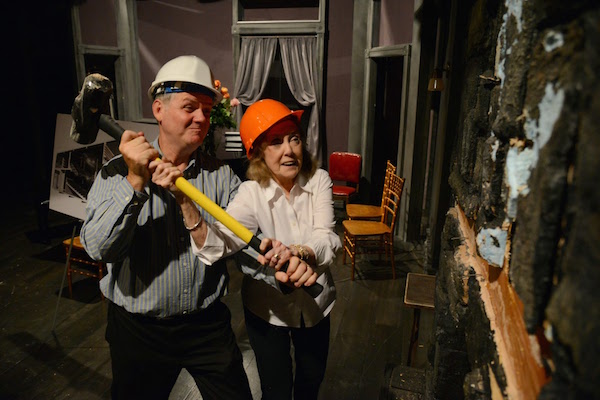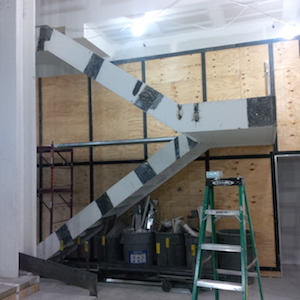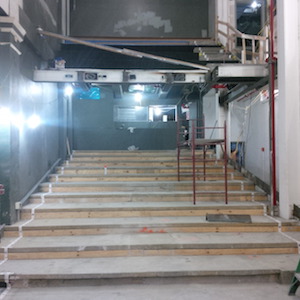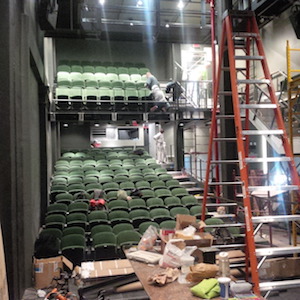
BY SCOTT STIFFLER | Anyone who’s ever introduced a nail to the business end of a hammer will eagerly testify that a clear vision of things to come is no match for the shocking lack of respect construction projects have for deadlines. So it’s more a product of steely resolve than luck that the Irish Repertory Theatre’s W. 22nd St. space is back in business on time, and, for the most part, functioning as planned — but it took a bold public declaration to ensure their line in the sand didn’t stray from its original location.
“When we put a poster up outside the theatre with the date of May 17 as the first preview, and announced ‘Tickets are now on sale,’ everybody knew the doors had to open,” said Ciarán O’Reilly, Producing Director of the Irish Rep, regarding their return to a vastly improved version of the place they’ve called home since 1994, when the nomadic company put down roots in Chelsea’s 1911-built Stanwick Building.
“We thought we would be in more toward the end of last year than now,” said O’Reilly, who admitted in an early May phone interview that this best-case scenario existed purely “in our dream world. So everybody thinks, as far as construction goes, we’ve ended up in an extraordinary place.”
For a man whose stock and trade involves the fine calibration of drama to achieve maximum effect, “extraordinary” may actually be an understated description of the very nearly realized $14 million “Campaign For a Permanent Home” project that began in September 2014 — when Irish Rep co-founders Charlotte Moore and O’Reilly stood at the tip of stage left, gripped their hands around a single sledgehammer, and took the first of many hefty swipes necessary to bring major structural changes and technological improvements to the two floors that their nonprofit arts organization had just gone from renting to owning. Although O’Reilly would spend the next 20 months making frequent visits to the site, it was the last time he’d wield an instrument of destruction in the name of progress.

“I wore the hard hat, that was mandatory,” he recalled, “but handling the tools would not have been allowed. There were four different contractors on the job, and it was run by the city,” whose $6 million contribution to the project was administered through the Department of Design and Construction. “There’s an awful lot of moaning about the city,” O’Reilly acknowledged. “But, at the end of the day, we had huge respect for them, working within a system that can be extremely complicated and dense. So you can grind your teeth and say, ‘Why is this or that not happening?,’ but they have a process to go through to make the system work for us. It took thousands of pages of paperwork, just to make things right. It’s taxpayers’ money at work, and has to be accounted for.”

Irish Rep’s facade, box office, rehearsal, and administrative spaces underwent changes, ranging from the radical to the cosmetic. All of the major tasks are complete, although O’Reilly was quick to point out that visitors should note, “It’s not 100 percent. There’s a good number of finishes that are still on back order; wood paneling on the walls, special lighting for the pillars. That will happen throughout the summer. In the fall, we’re going to have the opening of the whole institution.”
Certain signature flourishes remain; the lobby’s distinctive stained glass windows, for example. Other features are new, such as the air conditioning system, which divides the building into 14 different zones. The second floor rehearsal studio also underwent major changes; all the better to be occasionally cast in the role of community room and gallery space (through June 24, the newly christened Irish Rep Gallery presents Geraldine O’Sullivan’s “16 Letters” exhibition of collages based on correspondence before, during, and after the Easter Rising and the First World War). Spacious new bathrooms (both of them unisex, one wheelchair accessible) were added to the second floor, with a similar pair on the ground level inside the Francis J. Greenburger Mainstage — whose expanded height (now 24 feet, from its previous 12) creates, for those familiar with the original facility, the perception of having suddenly entered a grand loft space more likely to be found in an altogether different part of town.

“You’re looking at two floors now instead of one, when you’re sitting in the theatre,” O’Reilly noted. To access the new 40-seat balcony, a wall was knocked down, during the addition of a lighted staircase (outfitted with a metallic mesh railing that furthers the aesthetic of openness). In doing so, it was good riddance to a portion of the theatre whose sight lines were a source of contention for audiences, actors, and directors alike.
“We were very conscious of what we used to call our ‘jury’ section,” he said, recalling with very little fondness how it “forced us to cater to the audience to our right as well as to our main section in the front, where most of the seats were. In the old space, the couch [the focal point of their current production] would have to be much further back. Now, we can bring the actors right into the spotlight and not have to worry about serving a profile audience. There’s a wing section where the ‘jury’ seats used to be, so we have a backstage that allows us to roll on scenery. We also have a beautiful new revolving stage.”
Don’t expect to be dazzled by any of the imagery and action that sort of technology can achieve, should you (and you should) attend “Shining City,” the production chosen to launch Irish Rep’s revamped facility. A brooding tale of the emotionally bruised and physically displaced, “City” manages to pack a wallop without deploying any of the flashy tech upgrades.
“They’re permanent installations, to be used when a play requires five, six, seven scenes,” O’Reilly notes, of the tracking and revolving options. “I don’t think Charlotte and I would pick a season based on showing off those things,” he asserts, while politely declining to tip his hat regarding a summertime announcement that will list the choices for their next season. “It has to be the right thing to do,” he says of their new toys, “but it’s good to know that when the time comes, we can pull it off.”
O’Reilly did, however, happily confirm that despite significant changes to the Mainstage space, Irish Rep’s good working relationship with sound waves remained intact.

“We were living in dread of it,” O’Reilly said, recalling their maiden voyage with a full house. “It had somewhat perfect acoustics before. You really could whisper on the stage and be heard in the back row. And we were afraid, with double the ceiling height, we were going to lose that, which seems to not be the case. Sound travels well. The actors need to look up a little bit more to acknowledge the presence of the balcony, but it’s just a slight adjustment of the head, really.”
More significant adjustments were required, however, when keeping every element of production in-house was no longer an option.
Irish Rep’s W. 22nd St. base, O’Reilly notes, “had become a pretty well-oiled machine” before the walls came tumbling down. “We have really missed that feeling of going to one place where rehearsals happen, and where our offices are,” he said, noting that his schedule on any given day during the past year-and-a-half might involve an early morning visit to check on progress at the Chelsea theatre, office work in Midtown (on Park Ave., in the same building as the Irish Consulate), rehearsals at A.R.T./New York (Eighth Ave. & W. 36th St.), and then off to Union Square’s DR2 Theatre, where much of the past two seasons took place.
It’s something more than coincidence, then, that “Shining City” speaks to the universal longing for a place to call one’s own, and functions as a reunion on more than one level. This is the first NYC revival of “Shining City” since its 2006 Broadway run — and it marks yet another Irish Rep presentation of Conor McPherson’s work, following “Port Authority” and “The Weir” during their time at DR2 (both polished and highly enjoyable productions, and similarly wrenching as “City” in their raw portrayal of those who yearn for roots while coping with loss).
O’Reilly, who directs “City,” expressed gratitude and pride for the theatre’s “terrific rapport with Conor, whom we think is one of Ireland’s top living playwrights.” This work, he notes, “is almost all about dislocation. All of the characters are out of their homes, and trying to find a home within themselves. It’s a quite seemingly simple play — one set, four actors; and at this time, with so much else going on, it seemed to have the right feel for us coming back.”
Having old friend Matthew Broderick on board is another coup for O’Reilly, who notes, “I just sent him the script, not really thinking he was going to say ‘yes.’ But it was such a good script for him; quite different. It allows him to bury deep into something. He’s better known for musicals and comedy, which he has a huge flair for — but this was a different attack.”

Stopping short of a review (“Shining City” is embargoed for such scrutiny until its official premiere), this publication can happily confirm that even in previews, Broderick’s performance as a guilt-ridden man — driven to seek counseling after a jarring encounter (real or imagined?) with his deceased wife — hits home, especially when confronting the sequence of events that led him to lose control, then lose his bearings. It’s a facet of the human condition that’s utterly appropriate, O’Reilly notes, for Irish Rep’s return to form after being “suddenly scattered to the wind. We were so used to steering our own ship, so we really missed the neighborhood. We never got over that.”
“Shining City” is currently in previews (then, running June 9–July 3). At the Irish Repertory Theatre (132 W. 22nd St., btw. Sixth & Seventh Aves.). Irish Rep’s 2016 Gala Benefit (“Finian’s Rainbow: In Concert”) happens Mon., June 13, 7pm, at The Town Hall (123 W. 43rd St.). The performance (hosted by Saoirse Ronan, with Tony Award winner Jim Norton in the title role) will be followed by dinner at Bryant Park Grill (25 W. 40th St.). For reservations to the Gala (single tickets start at $100; premium seating/dinner packages start at $500) or tickets to “Shining City” ($70), call 212-727-2737 or visit irishrep.org.



































